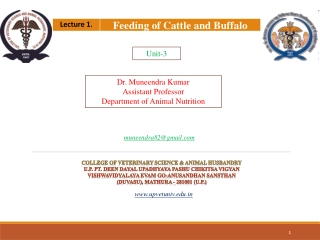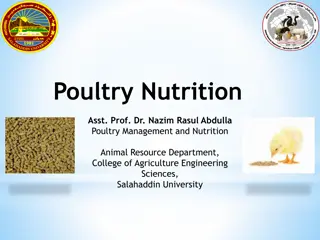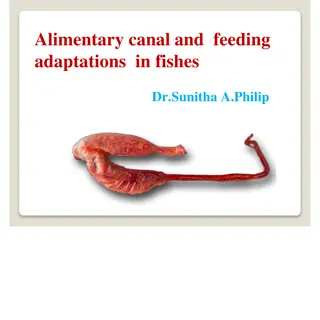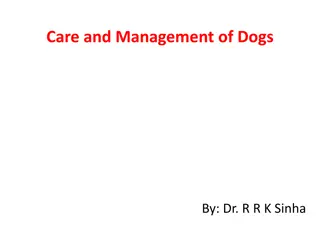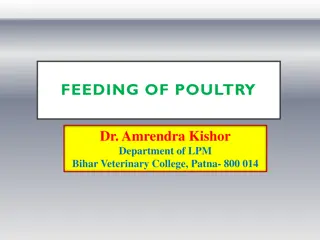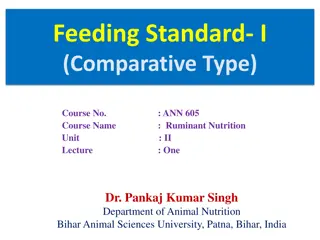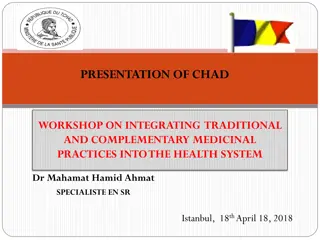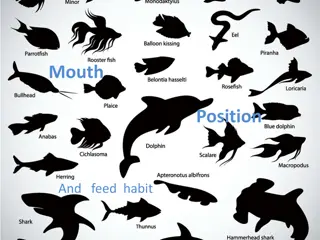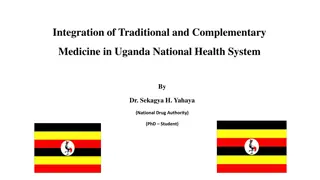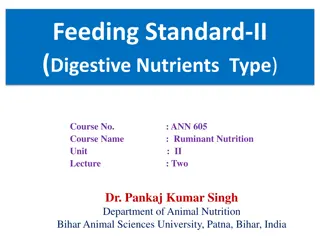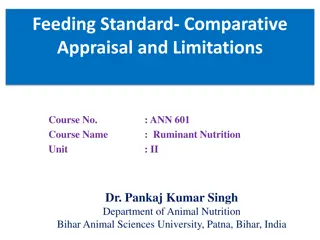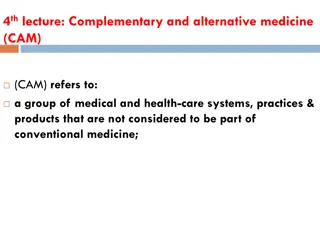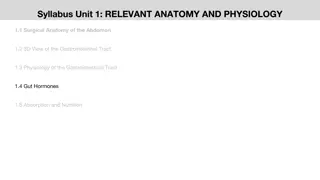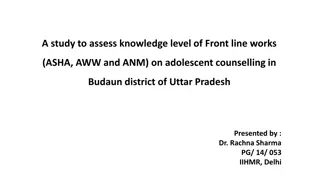Feeding of Cattle and Buffalo
Explore the key concepts of ration formulation for feeding cattle and buffalo, focusing on balanced nutrition, ingredients, characteristics of a good ration, and best practices to ensure optimal health and productivity. Learn from Dr. Muneendra Kumar, Assistant Professor at the Department of Animal
0 views • 58 slides
Understanding Composite Fish Culture for Increased Productivity
Composite fish culture involves stocking different fish species with varying feeding habits in the same pond to optimize space and resources. This method allows for the utilization of all niches in the pond, leading to assured production and easy management. The article covers the species involved,
6 views • 16 slides
Guidance on Hospice Care and Feeding Tubes for Elderly Patients
Learn about the appropriateness of hospice care for a 74-year-old female with heart failure and the use of feeding tubes for an 89-year-old female with advanced Alzheimer's dementia. Understand important considerations for palliative care decisions.
4 views • 125 slides
Poultry Nutrition
Developments in poultry nutrition have led to increased productivity in the industry over the past 20 years. The focus is shifting towards life-cycle feeding programs for different bird classes rather than individual diets. Poultry diets consist of various feedstuffs providing essential nutrients fo
2 views • 33 slides
Looking for the best Massage in Hanwell
My name is Roberto Florentino Lopes. They provide the best Massage in Hanwell. I trained at The London School of Massage and qualified with distinctions in: Level 3 Diploma Anatomy, Physiology, Pathology and Massage. Level 3 Diploma in Reflexology for the Complementary Therapist. Level 2 Diploma Inf
0 views • 6 slides
Alimentary Canal and Feeding Adaptations in Fishes by Dr. Sunitha A. Philip
The presentation discusses the alimentary canal and feeding adaptations in fishes, covering topics like the different regions of the gut, mouth types in fish, adaptation of teeth for specific diets, and the roles of the buccal cavity, pharynx, and gill rakers. It further explores how gill rakers var
0 views • 24 slides
Understanding the Basics of Color Theory
A color wheel organizes colors into primary, secondary, and tertiary categories. Primary colors are red, blue, and yellow; secondary colors are green, violet, and orange; and tertiary colors are mixtures of primary and secondary colors. The value of a color refers to how light or dark it is, with ti
1 views • 10 slides
Understanding Complementary and Alternative Medicine (CAM)
Complementary and Alternative Medicine (CAM) encompasses various treatments, ranging from herbs to yoga, that differ from traditional Western medicine. While complementary medicine involves using these therapies alongside conventional medicine, alternative medicine opts for non-mainstream approaches
2 views • 20 slides
Healthy and Happy Families Social Media Strategy 2021 in Myanmar
Healthy and Happy Families (HHF) in Myanmar leverages Facebook as its main social media platform to disseminate knowledge on optimal breastfeeding, complementary feeding, maternal nutrition, and dietary practices. By engaging with a diverse target audience, HHF aims to promote a breastfeeding-suppor
0 views • 17 slides
Infant Nutrition and Growth Development Overview
This informative content covers various aspects of infant nutrition and growth development, including breastfeeding, complementary feeding, and common nutritional problems. It also discusses assignments related to assessing nutritional status, harmful traditional practices, and the importance of neo
3 views • 61 slides
Comprehensive Guide on Dog Care and Management
Learn about housing, feeding, and dimensions of kennels for dogs, along with tips on appropriate feeding that plays a crucial role in keeping dogs healthy and fit. Dr. R.R. K. Sinha provides valuable insights on the care and management of dogs, emphasizing the importance of suitable housing, feeding
0 views • 42 slides
Essential Guidelines for Feeding Poultry for Optimal Production
Feeding poultry is a crucial aspect of poultry production, accounting for a significant portion of total expenses. Quality feed and proper feeding methods are key to maximizing efficiency. Understanding the nutritional needs of poultry, including water, carbohydrates, proteins, fats, vitamins, and m
1 views • 18 slides
Exploring Integrative Oncology and Patient-Centered Cancer Care
Integrative oncology blends conventional cancer treatments with mind-body practices, natural products, and lifestyle modifications to improve health, quality of life, and clinical outcomes. This approach empowers individuals to actively participate in their care journey, promoting overall well-being
0 views • 18 slides
Understanding Proteins: Alternatives and Complementary Choices
Explore the world of proteins with a focus on alternatives to meat-based meals and the concept of complementary proteins. Discover different sources of protein, understand the difference between complete and incomplete proteins, and learn how to combine foods to ensure you're meeting all essential a
0 views • 9 slides
Understanding Feeding Standards and Their Objectives in Livestock Nutrition
Feeding standards provide tables indicating nutrient quantities necessary for livestock based on various physiological functions like growth, maintenance, lactation, and more. Objectives include guiding farmers in selecting balanced rations and classifying functions for individual animal needs. Glos
0 views • 13 slides
Chad Workshop on Integrating Traditional and Complementary Medicinal Practices
Chad held a workshop on integrating traditional and complementary medicinal practices into the health system, emphasizing the importance of traditional medicine alongside modern medical care. The presentation highlighted the country's population, reliance on traditional medicine, legal frameworks, a
0 views • 12 slides
Understanding Fish Mouth Positions and Feeding Habits
The position of a fish's mouth reveals valuable information about its feeding habits, behavior, and lifestyle. Fish mouths can be categorized as superior (upward-facing), terminal (forward-facing), or inferior (downward-facing), each adapted for specific feeding strategies. Superior mouths are ideal
5 views • 10 slides
Infant and Young Child Feeding in Emergencies: Operational Guidelines
Infant and Young Child Feeding in Emergencies (IYCF-E) focuses on protecting and supporting safe feeding practices for infants and young children during all types of emergencies to reduce mortality and morbidity risks. Key actions include developing policies, training staff, coordinating operations,
4 views • 10 slides
Integration of Traditional and Complementary Medicine in Uganda's National Health System
Dr. Sekagya H. Yahaya discusses the integration of traditional and complementary medicine in Uganda's health system, highlighting types of TCM applications, national policies and regulations, outdated acts of parliament that can be amended, standardization of TCM education, and initiatives to train
0 views • 8 slides
Evolution of Feeding Standards for Ruminants: A Historical Perspective
The evolution of feeding standards for ruminants dates back to the 19th century, with pioneers like Grouven and Wolff introducing various criteria based on nutrient types and digestibility. Despite initial shortcomings, subsequent refinements by researchers like Professor Kuhn and Atwater have shape
0 views • 18 slides
Understanding Feeding Standards in Ruminant Nutrition
Feeding standards play a crucial role in determining the nutritional needs of animals for optimal health and productivity. They consider factors like productivity, product composition, and physiological conditions, guiding effective nutritional management. Despite their usefulness, feeding standards
0 views • 8 slides
Sheep and Goat Clinic: Feeding, Exercising, and Show Preparation Tips
Topics covered in the Sheep and Goat Clinic include feeding strategies (last 90 days), the importance of balancing fat levels, exercising routines leading up to show day, and final points on feeding and fat management. The images provide valuable insights on feeding athletes, understanding fat level
0 views • 20 slides
Advancing Neutron Sources for Complementary Experiments at DONES
Exploring further potential for utilizing fast neutron sources, the DONES project aims to expand its scope beyond fusion materials studies. The ELAMAT Consortium, spearheading the bid for hosting DONES in Poland, envisions incorporating additional scientific areas for complementary research. Complem
0 views • 7 slides
Global Impact of Infant and Young Child Feeding (IYCF) Strategies
Global strategies like Infant and Young Child Feeding (IYCF) developed by WHO and UNICEF aim to address the high mortality rates among children under 5 due to malnutrition. The strategies emphasize the importance of appropriate feeding practices during pregnancy, lactation, and early childhood to co
0 views • 14 slides
Integrating Nutrition Assessment and Counselling: Complementary Feeding Practices
This training course focuses on educating facility-based health providers on complementary feeding practices, emphasizing the importance of introducing solid foods along with breastfeeding at 6 months. The session covers topics like nutrition gaps in breast milk, optimal feeding principles, and util
0 views • 48 slides
Feeding Practices for LBW Infants in LMICs
Improved survival rates of small babies highlight the importance of nutrition for LBW infants. Research into feeding practices in LMICs is crucial for promoting growth and development. Studies compare formula milk to human milk, exploring effects on growth, development, morbidity, and mortality. Evi
0 views • 21 slides
Importance of Feeding Infants with Breast Milk and Iron-Fortified Formula
Breast milk and iron-fortified infant formula are recommended for infants to meet their nutritional needs and support optimal development. Breast milk offers numerous health benefits, protecting infants from illnesses and reducing the risk of obesity. Iron-fortified formula is a suitable alternative
0 views • 23 slides
Challenges in Feeding Low Birth Weight Babies in Kenya
Addressing critical issues in feeding low birth weight babies in Kenya, including the lack of accurate birth weight measurements, preterm birth rates, and the risks associated with formula milk feeding. Strategies such as promoting expressed breastmilk and supporting mothers in neonatal units are di
2 views • 15 slides
Guidance for Complementary Feeding in Infants
After 6 months of age, breastfed infants may struggle to meet their nutrient needs from milk alone, necessitating the introduction of complementary foods. Implementing guiding principles can help ensure optimal nutrition and growth, including exclusive breastfeeding for the first 6 months, practicin
0 views • 18 slides
Assisting with Oral Feeding, Dysphagia Management, and Enteral Tube Feeding in Healthcare
This content covers essential aspects of assisting with oral feeding for individuals at risk for aspiration, managing dysphagia with specific recommendations and diet progression, and enteral tube feeding procedures and complications. It emphasizes safety, dignity, and independence in feeding practi
3 views • 12 slides
Assisting with Enteral Tube Feeding and Dysphagia Management
This content covers essential information on assisting with oral feeding for patients at risk of aspiration, managing dysphagia, diet progression, and enteral tube feeding procedures. It emphasizes safety, independence, and dignity in feeding practices. The content includes tips for preventing aspir
0 views • 12 slides
Integrating Nutrition Assessment and Counseling for Child Feeding During Illness
This training session focuses on the importance of feeding children during illness and recovery, discussing feeding practices and options in difficult circumstances. Participants will learn strategies to encourage children to eat during challenging times, emphasizing the goal of continuing feeding r
0 views • 32 slides
Trends in Complementary Therapies Use for Breast Cancer in Chile
Complementary therapies (CT) use, including natural medicine and homeopathy, is on the rise among individuals with and without a breast cancer diagnosis in Chile. While some CTs are not included in the official healthcare package, there is increasing interest in incorporating them due to high satisf
0 views • 4 slides
Ration Formulation and Feeding Practices for Dairy Cattle and Buffaloes
This informative article discusses the importance of colostrum feeding, milk feeding to calves, and milk feeding schedules for dairy cattle and buffaloes during various phases. It emphasizes the significance of timely colostrum intake for immunity development and the proper feeding of whole milk or
0 views • 20 slides
Overview of Complementary and Alternative Medicine (CAM)
Complementary and Alternative Medicine (CAM) encompasses diverse medical practices, products, and systems outside conventional healthcare. CAM includes treatments like acupuncture, herbal remedies, and meditation. Epidemiological data shows widespread usage, particularly for conditions such as back
1 views • 20 slides
Understanding Re-feeding Syndrome: Metabolic Alterations and Pathophysiology
Re-feeding Syndrome (RS) is a critical condition characterized by severe metabolic changes during the repletion of underweight or malnourished individuals. The syndrome's hallmark is severe hypophosphatemia, leading to multisystem complications. This summary delves into the biochemical basis of RS,
0 views • 25 slides
Integration of Complementary Medicine in Cancer Care in Tuscany
Describes the successful integration of Complementary Medicine in the network of Cancer Departments within the Tuscan Public Healthcare System. The initiative, spearheaded by experts in both Complementary Medicine and medical oncology, has led to the development of Regional Guidelines incorporating
0 views • 4 slides
Understanding the Role of Gut Hormones in Regulating Feeding Behavior
The syllabus covers relevant anatomy and physiology related to the gastrointestinal tract, emphasizing the regulation of feeding processes. It discusses the role of gut hormones such as ghrelin, obestatin, cholecystokinin, pancreatic polypeptide (PP), and peptide YY (PYY) in controlling appetite, en
0 views • 7 slides
Enhancing Front-line Workers' Knowledge on Adolescent Counselling in Budaun, Uttar Pradesh
A study conducted by Dr. Rachna Sharma focuses on assessing the knowledge level of front-line workers (ASHA, AWW, and ANM) on adolescent counselling in Budaun district, Uttar Pradesh. The study aims to improve the efficiency and effectiveness of key RMNCHA interventions in underserved areas, particu
1 views • 20 slides
Exploring the Concept of Ying Yang and Opposites in Nature
The Yin Yang symbol represents the balance of opposite energies in nature, where complementary forces can work together harmoniously. This article delves into the significance of opposites, showcases different Ying Yang designs, encourages creativity in designing your own symbol, and explores the co
0 views • 7 slides
